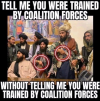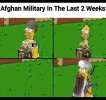I am still learning about the Vietnam War so my history is sketchy, but was Vietnam really the unwinnable war it was made out to be? My (limited) understanding of it is that the U.S. military was heavily hamstrung in its actions due to how Washington was micromanaging the whole affair. For example, instead of just going all-out and bombing the hell out of the Northern forces and their supply lines, Washington thought it proper to each time in response to an attack to gradually increase the level of force being used. This meant the North could very easily adapt to the bombings and thus not be affected. One of the Northern generals though said that if the U.S. had bombed the supply lines heavily from the beginning, the North would not have been able to continue with the war.
In spite of all that, the North still was on the ropes and tried its last desperate attack with the Tet Offensive which ended in massive failure. But then Walter Cronkite (wrongly) reported that the war had essentially reached a stalemate and thus public opinion turned against the war. So Ho Chi Minh decided to hang on. In spite of this, the North still failed to take the South and the South was able to stand on its own for some years after the U.S. withdrew all of its forces. What caused its fall was the pulling of the funding to it by Congress. With the Gulf War, the military sought to make sure that what had happened in Vietnam with all of the government micromanaging would never happen again and thus this time went in guns ablazing against Saddam's forces.
So I mean it seems like Vietnam might well have been winnable had they executed it correctly (although not saying even if very winnable that going into it was the right idea).






